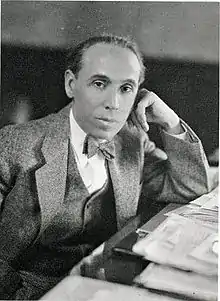Giuseppe Mario Bellanca
Giuseppe Mario Bellanca (March 19, 1886 – December 26, 1960) was an Italian-American aviation pioneer, airplane designer and builder, who is credited with many design firsts and whose aircraft broke many aviation records. His futuristic aircraft designs greatly advanced the United States commercial and military interests. He was inducted into the National Aviation Hall of Fame in 1973.[1] According to aviation historians Alan and Drina Welch Able, "G.M. Bellanca did more for general aviation than any other person during aviation's first 100 years."[2] The Bellanca C.F., the first enclosed-cabin monoplane, is on display at the National Air and Space Museum.[3]
Giuseppe Mario Bellanca | |
|---|---|
 Bellanca circa 1930 | |
| Born | March 19, 1886 Sciacca, Italy |
| Died | December 26, 1960 (aged 74) New York City, New York, U.S. |
| Children | August Bellanca |
Biography
He was born on March 19, 1886 in Sciacca, Italy. He graduated with an engineering degree from Politecnico di Milano. He emigrated to Brooklyn in the United States in October 1911 where he operated the Bellanca Flying School (1912–16).[nb 1]
In 1913 He created the first modern aircraft design (tractor design) that featured an engine and propeller in the front with a wing in the middle and a tail to the aft. This design has become the archetype for most all following aviation designs.[1]
In 1921, he moved to Omaha, Nebraska, and with Victor Roos, formed the Roos-Bellanca Aircraft Company. On July 4, 1927, he was featured on the cover of Time.[5]
In that year, he entered into a partnership with Charles A. Levine and formed the Columbia Aircraft Corp.[5]
In 1922 he built the first enclosed-cabin monoplane in the United States. Called the Bellanca C.F. , this aircraft is now on display at the National Air and Space Museum's Steven F. Udvar-Hazy Center.[3]
On April 25, 1927, Clarence Chamberlin and Bert Acosta set a new world's non-refueled endurance record in the Bellanca designed WB-2.[5]
After the short-lived partnership with Levine, Bellanca formed a new company, The Bellanca Aircraft Corporation of America in financial partnership with the du Pont family. The company would go on to develop a wide range of general aviation and light commercial aircraft. American Champion still produces products with a Bellanca lineage.[6]
In 1941, Bellanca was appointed as the head of the aviation department at Higgins Industries, in New Orleans. He designed cargo aircraft during World War II. In 1954, he formed the Bellanca Development Company.[5]
He died from leukemia at Memorial Hospital in New York City on December 26, 1960.[7]
He was inducted into The National Aviation Hall of Fame in 1973.[1]
Archive
In 1993, his papers were archived at the National Air and Space Museum.[5]
See also
Notes
- Bellanca taught Fiorello La Guardia how to fly in exchange for driving lessons.[4]
References
| Wikimedia Commons has media related to Giuseppe Mario Bellanca. |
- "Bellanca, Giuseppe Mario : National Aviation Hall of Fame". www.nationalaviation.org. Retrieved 2021-02-05.
- Abel, Alan & Drina Welch (2004). Bellanca's Golden Age. Wind Canyon Books. pp. Introduction page. ISBN 1-891118-46-3.
- "Bellanca C.F." National Air and Space Museum. Retrieved 2021-02-05.
- "The Giuseppe M. Bellanca Collection". National Air and Space Museum, Archives Division. Retrieved 2013-08-23.
- "Biographical and Historical Notes". National Air and Space Museum. Retrieved 2011-11-20.
- Donald M. Pattillo. A History in the Making: 80 Turbulent Years in the American General Aviation Industry. p. 17.
- "Air Pioneer Dies at 70". Associated Press in the Tri City Herald. December 22, 1960. Retrieved 2011-11-20.
Giuseppe Mario Bellanca, one of the great figures of aviation history, is dead at 74. He died at Memorial Hospital Monday of leukemia. ...